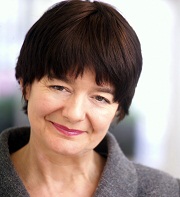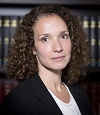Jayne Adams QC – Ropewalk Chambers, Nottingham
 Jayne Adams QC was one of the 107 applicants appointed to silk in the 2015/2016 QC Competition. Jayne specialises in personal injury, clinical negligence, and fraudulent claims litigation but has focused increasingly on industrial disease work in recent years and this now accounts for some 70% of her case load. Whilst always working in the personal injury field, earlier in her career Jayne had also specialised in work on many abuse-in-care cases. However she had reached a point where she felt that she had done enough such work which “could take its toll”. So having worked on what was to become a leading case on industrial deafness during pupillage, (her pupil master had specialised in the area) the decision to reduce the abuse work provided the spur for Jayne to take on more cases on industrial diseases. Jayne said that she realised it might sound a bit morbid, but she found the legal and factual complexities surrounding issues such as chemical poisoning fascinating.
Jayne Adams QC was one of the 107 applicants appointed to silk in the 2015/2016 QC Competition. Jayne specialises in personal injury, clinical negligence, and fraudulent claims litigation but has focused increasingly on industrial disease work in recent years and this now accounts for some 70% of her case load. Whilst always working in the personal injury field, earlier in her career Jayne had also specialised in work on many abuse-in-care cases. However she had reached a point where she felt that she had done enough such work which “could take its toll”. So having worked on what was to become a leading case on industrial deafness during pupillage, (her pupil master had specialised in the area) the decision to reduce the abuse work provided the spur for Jayne to take on more cases on industrial diseases. Jayne said that she realised it might sound a bit morbid, but she found the legal and factual complexities surrounding issues such as chemical poisoning fascinating.
Jayne’s industrial diseases caseload now covered noise-induced hearing loss, hand arm vibration syndrome, work-related upper limb disorder, stress at work, bladder cancer and silicosis and other lung diseases (particularly asbestos related disease). Jayne had noted with pleasure that she was one of no fewer than four QCs successful in the competition who were specialists in industrial diseases – one of whom is a friend and frequent opponent in asbestos cases. In addition, Jayne also had a substantial and continuing workload of clinical negligence, personal injury, counter-fraud, professional disciplinary and regulatory cases.
We spoke about how Jayne came to be a barrister and now Queen’s Counsel. She explained that she came from an “ordinary background” – both her parents had left school at fourteen (and her Dad had been brought up in a children’s home) and she and her three sisters (and their cousins) were the first generation of their family to attend university. Her parents were aspirational and Jayne felt that she benefitted greatly from attending grammar school in Birmingham. This enabled her to aspire to university and a profession. Her school tended to encourage high attaining pupils to “become either doctors or lawyers” and since Jayne did not wish to become a doctor and because she “enjoyed arguing!” she chose the law. It was whilst studying law at university that Jayne decided that she wanted to go on to Bar School and become a barrister because “the work became the most interesting at the point where it was handed over by the solicitor.”
Jayne said that whilst silk was something she had always wanted to consider, she had delayed applying for a good many years for a number of family and non-work related reasons. However, two years ago and following a particularly intricate case where she was up against a QC, that opponent and her Head of Chambers had suggested that she should think seriously about applying for silk. The time seemed right for Jayne and although she said that she had never been one of those barristers who had always hankered for the ‘badge’ of QC, she had felt that she owed it to herself to make an application now. (Jayne pointed out that she seemed to be the second oldest successful applicant in the 2015/16 Competition.) She said that both her clerk and her Head of Chambers had been “hugely supportive” of her during both of her application attempts. Jayne said that she realised that she had the requisite cases of substance but that her difficulty was in finding enough suitable judicial assessors because most of her cases settle. Furthermore, her practice meant that she had limited exposure to the most senior judges, and then only on relatively routine matters at very short hearings. With hindsight, Jayne said that she left herself insufficient time to properly prepare for her first application (in 2014/15) as she had only decided to apply for QC a few weeks before the opening date for applications. She was much better prepared for her second application.
Jayne had been interviewed on her first application but she had found the experience “extremely frustrating”. In particular, she had felt that the interviewers did not really understand her practice. She also considered that she was not specifically asked about an area she was ultimately determined not to have demonstrated excellence in, gleaning this only from her written feedback.
Jayne said that “everyone I spoke to in the intervening period – between my first and second applications – told me that they had sought help with their application, from outside trainers”, and she did so herself this time. Jayne felt she benefited from this help and considered that it was inevitable that people would seek such help, albeit the QC Selection Panel tended to discourage it. She pointed out that most barristers had little experience of competency-based interviewing or indeed recent experience of an interview at all, added to which it was a rather alien experience for a barrister having to advocate for him/herself rather than for a client. Although Jayne did not consider there to be any difference in strength between the two applications, the professional assistance emphasised the need to really sell herself and pointed to putting forward matters which she had thought self-evident.
Jayne said that she found her second interview “much fairer” and far more satisfactory. She felt that she had been given a full opportunity to give the best account of herself and that if she had ultimately been unsuccessful, while disappointed, she would have felt that she had had a fair hearing. The interview pair had understood the nature of her practice and appreciated her specialist knowledge of the law, and why she had relatively limited exposure to the most senior judges, she said. For her own part, Jayne said that she was “far less reticent” at interview and much better prepared to explain the nature of her work, to demonstrate excellence in the competencies using evidence, and much better able to convince the interviewers about the substance of her cases.
I was interested to learn Jayne’s view on why so relatively few women become silks even now. She felt that by and large women had “less ego” than their male counterparts and were more likely to think very carefully about whether they were ready for silk and whether it was something which they really wanted. In other words, women were less likely to ‘take a punt’ on a silk application. It was certainly the case we noted that proportionally women applicants for silk are consistently more successful than men. Jayne said that as a female of her generation you “still have to be better than the male barristers to compete equally”, although she noted wryly that things were not as chauvinistic as she had experienced in her early days as a young female barrister having to visit steel plants and the like where the men “were even afraid to swear in front of me, for heaven’s sake!”
Jayne said that a key spur to her finally applying for silk had been the prospect of getting more of the very best cases in her specialism, which she had begun to get as a highly experienced senior-junior. As a silk, she would also relish not having to travel around the country so much – she said she would be “very happy not to be on the 5am train from Nottingham to Swansea” for a hearing. There would, however, be continuity with her pre-silk practice, with about 50% of her work consisting of similar cases as ‘pre-silk’. She still had a “mountain of work” and now the expectations on her were even higher (not least as only the second QC currently in her chambers), so there could be no question of resting on her silk ‘laurels’.
Jayne said that the silk ceremony back in February had been a great and memorable day, and one which the whole family had thoroughly enjoyed. She had been accompanied by all three of her sisters and by her barrister husband and their own three children. Then it was back to reality.
© Queen’s Counsel Appointments Ltd
Jayne Adams QC – Ropewalk Chambers, Nottingham
Jayne Adams QC was one of the 107 applicants appointed to silk in the 2015/2016 QC Competition. Jayne specialises in personal injury, clinical negligence, and fraudulent claims litigation but has focused increasingly on industrial disease work in recent years and this now accounts for some 70% of her case load. Whilst always working in the personal injury field, earlier in her career Jayne had also specialised in work on many abuse-in-care cases. However she had reached a point where she felt that she had done enough such work which “could take its toll”. So having worked on what was to become a leading case on industrial deafness during pupillage, (her pupil master had specialised in the area) the decision to reduce the abuse work provided the spur for Jayne to take on more cases on industrial diseases. Jayne said that she realised it might sound a bit morbid, but she found the legal and factual complexities surrounding issues such as chemical poisoning fascinating.
Jayne’s industrial diseases caseload now covered noise-induced hearing loss, hand arm vibration syndrome, work-related upper limb disorder, stress at work, bladder cancer and silicosis and other lung diseases (particularly asbestos related disease). Jayne had noted with pleasure that she was one of no fewer than four QCs successful in the competition who were specialists in industrial diseases – one of whom is a friend and frequent opponent in asbestos cases. In addition, Jayne also had a substantial and continuing workload of clinical negligence, personal injury, counter-fraud, professional disciplinary and regulatory cases.
We spoke about how Jayne came to be a barrister and now Queen’s Counsel. She explained that she came from an “ordinary background” – both her parents had left school at fourteen (and her Dad had been brought up in a children’s home) and she and her three sisters (and their cousins) were the first generation of their family to attend university. Her parents were aspirational and Jayne felt that she benefitted greatly from attending grammar school in Birmingham. This enabled her to aspire to university and a profession. Her school tended to encourage high attaining pupils to “become either doctors or lawyers” and since Jayne did not wish to become a doctor and because she “enjoyed arguing!” she chose the law. It was whilst studying law at university that Jayne decided that she wanted to go on to Bar School and become a barrister because “the work became the most interesting at the point where it was handed over by the solicitor.”
Jayne said that whilst silk was something she had always wanted to consider, she had delayed applying for a good many years for a number of family and non-work related reasons. However, two years ago and following a particularly intricate case where she was up against a QC, that opponent and her Head of Chambers had suggested that she should think seriously about applying for silk. The time seemed right for Jayne and although she said that she had never been one of those barristers who had always hankered for the ‘badge’ of QC, she had felt that she owed it to herself to make an application now. (Jayne pointed out that she seemed to be the second oldest successful applicant in the 2015/16 Competition.) She said that both her clerk and her Head of Chambers had been “hugely supportive” of her during both of her application attempts. Jayne said that she realised that she had the requisite cases of substance but that her difficulty was in finding enough suitable judicial assessors because most of her cases settle. Furthermore, her practice meant that she had limited exposure to the most senior judges, and then only on relatively routine matters at very short hearings. With hindsight, Jayne said that she left herself insufficient time to properly prepare for her first application (in 2014/15) as she had only decided to apply for QC a few weeks before the opening date for applications. She was much better prepared for her second application.
Jayne had been interviewed on her first application but she had found the experience “extremely frustrating”. In particular, she had felt that the interviewers did not really understand her practice. She also considered that she was not specifically asked about an area she was ultimately determined not to have demonstrated excellence in, gleaning this only from her written feedback.
Jayne said that “everyone I spoke to in the intervening period – between my first and second applications – told me that they had sought help with their application, from outside trainers”, and she did so herself this time. Jayne felt she benefited from this help and considered that it was inevitable that people would seek such help, albeit the QC Selection Panel tended to discourage it. She pointed out that most barristers had little experience of competency-based interviewing or indeed recent experience of an interview at all, added to which it was a rather alien experience for a barrister having to advocate for him/herself rather than for a client. Although Jayne did not consider there to be any difference in strength between the two applications, the professional assistance emphasised the need to really sell herself and pointed to putting forward matters which she had thought self-evident.
Jayne said that she found her second interview “much fairer” and far more satisfactory. She felt that she had been given a full opportunity to give the best account of herself and that if she had ultimately been unsuccessful, while disappointed, she would have felt that she had had a fair hearing. The interview pair had understood the nature of her practice and appreciated her specialist knowledge of the law, and why she had relatively limited exposure to the most senior judges, she said. For her own part, Jayne said that she was “far less reticent” at interview and much better prepared to explain the nature of her work, to demonstrate excellence in the competencies using evidence, and much better able to convince the interviewers about the substance of her cases.
I was interested to learn Jayne’s view on why so relatively few women become silks even now. She felt that by and large women had “less ego” than their male counterparts and were more likely to think very carefully about whether they were ready for silk and whether it was something which they really wanted. In other words, women were less likely to ‘take a punt’ on a silk application. It was certainly the case we noted that proportionally women applicants for silk are consistently more successful than men. Jayne said that as a female of her generation you “still have to be better than the male barristers to compete equally”, although she noted wryly that things were not as chauvinistic as she had experienced in her early days as a young female barrister having to visit steel plants and the like where the men “were even afraid to swear in front of me, for heaven’s sake!”
Jayne said that a key spur to her finally applying for silk had been the prospect of getting more of the very best cases in her specialism, which she had begun to get as a highly experienced senior-junior. As a silk, she would also relish not having to travel around the country so much – she said she would be “very happy not to be on the 5am train from Nottingham to Swansea” for a hearing. There would, however, be continuity with her pre-silk practice, with about 50% of her work consisting of similar cases as ‘pre-silk’. She still had a “mountain of work” and now the expectations on her were even higher (not least as only the second QC currently in her chambers), so there could be no question of resting on her silk ‘laurels’.
Jayne said that the silk ceremony back in February had been a great and memorable day, and one which the whole family had thoroughly enjoyed. She had been accompanied by all three of her sisters and by her barrister husband and their own three children. Then it was back to reality.
© Queen’s Counsel Appointments Ltd
- Date: March 25, 2019
- Category: QCA Profiles 2016


